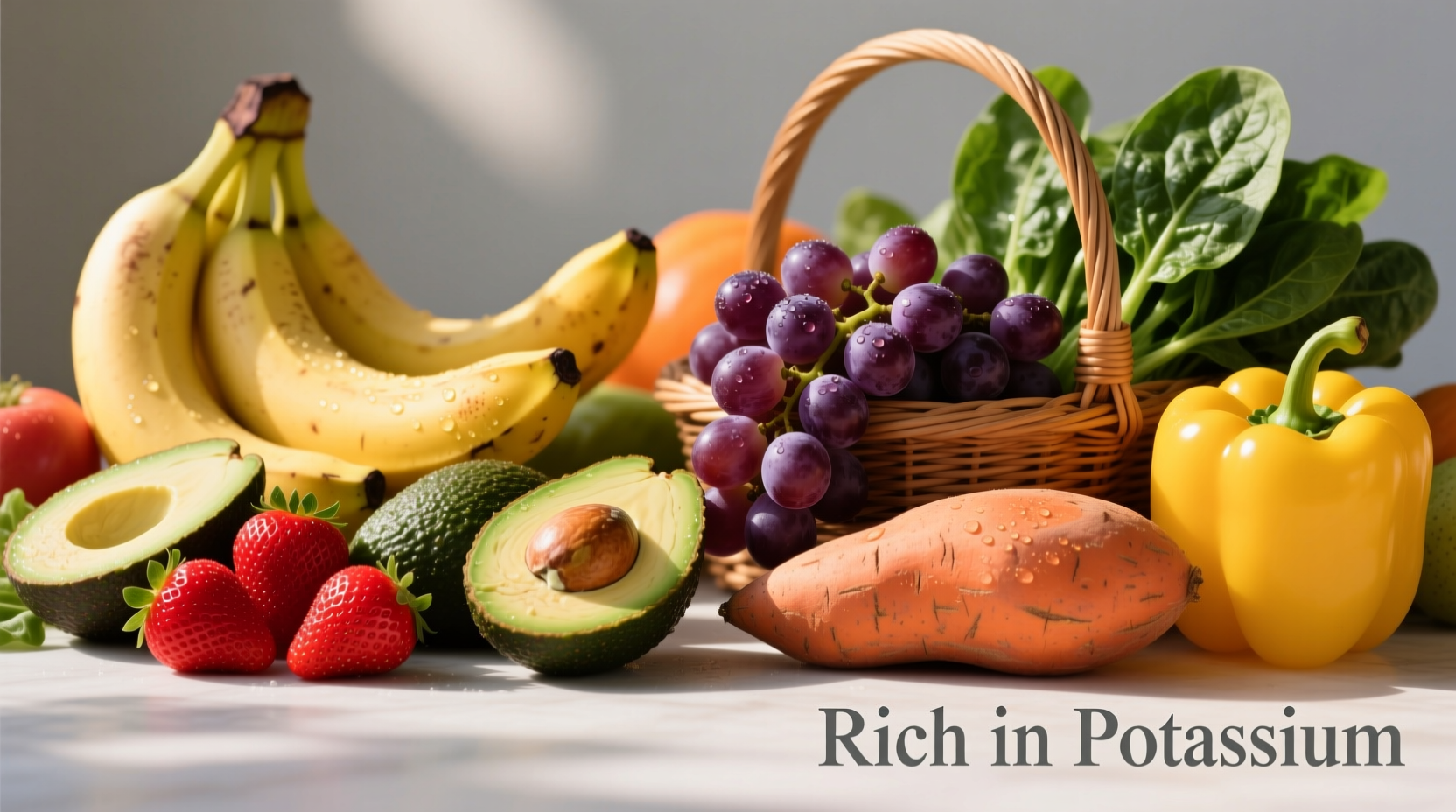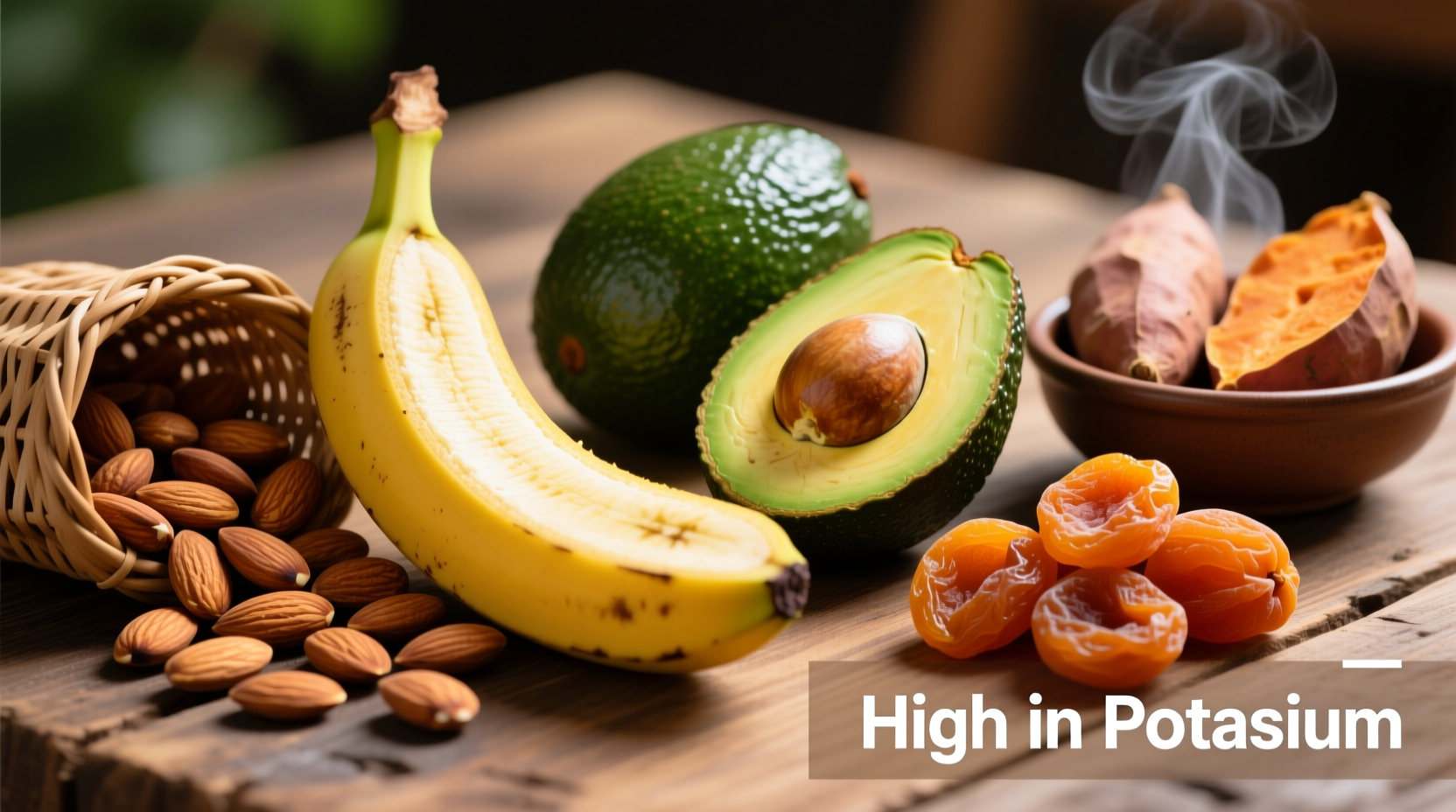Top potassium-rich foods include sweet potatoes (542mg per medium potato), bananas (422mg per medium fruit), spinach (839mg per cooked cup), avocados (708mg per whole fruit), and white beans (1,189mg per cup). These natural food sources provide essential potassium that supports heart health, muscle function, and blood pressure regulation.
Discover exactly which foods deliver the potassium your body needs to thrive. Whether you're managing blood pressure, recovering from exercise, or simply optimizing your nutrition, this guide reveals the most potent natural potassium sources backed by nutritional science. No more guessing which foods actually contain meaningful potassium levels—get precise serving sizes and practical ways to incorporate these nutrient powerhouses into your daily meals.
Your Complete Potassium Food Guide
Potassium isn't just another nutrient on a supplement label—it's a critical electrolyte your body uses for proper nerve signaling, muscle contractions, and fluid balance. The National Institutes of Health recommends adults consume 2,600-3,400mg daily, yet most people fall short. The good news? Nature provides abundant potassium-rich options that taste delicious while supporting your health.
Fruits Packed With Potassium
When most people think of potassium, bananas come to mind—but many fruits offer even higher concentrations. Understanding the actual potassium content per serving helps you make smarter choices.
| Fruit | Portion Size | Potassium (mg) | % Daily Value |
|---|---|---|---|
| Avocado | 1 whole (200g) | 708 | 15% |
| Banana | 1 medium (118g) | 422 | 9% |
| Orange | 1 medium (131g) | 237 | 5% |
| Cantaloupe | 1 cup diced (160g) | 473 | 10% |
| Dried Apricots | ½ cup (66g) | 755 | 16% |
According to USDA FoodData Central, dried fruits often contain more concentrated potassium than fresh varieties due to water removal. Just one-half cup of dried apricots delivers 16% of your daily potassium needs. However, be mindful of portion sizes as dried fruits also concentrate natural sugars.

Vegetables That Outperform Bananas
Many vegetables contain significantly more potassium than bananas. Incorporating these into your meals creates substantial dietary improvements without relying solely on fruit.
- Spinach - 839mg per cooked cup (18% DV)
- Sweet potatoes - 542mg per medium potato (12% DV)
- White beans - 1,189mg per cup (25% DV)
- Beet greens - 1,309mg per cooked cup (28% DV)
- Acorn squash - 896mg per cup (19% DV)
The National Institutes of Health Office of Dietary Supplements notes that cooking methods affect potassium retention. Boiling vegetables can leach potassium into water, while steaming or roasting preserves more of this valuable nutrient. For maximum potassium benefit, consume vegetables with minimal water exposure.
Protein Sources With Significant Potassium
Many protein sources also contribute meaningfully to your daily potassium intake, making them valuable for balanced nutrition.
- Salmon - 534mg per 3-ounce serving (11% DV)
- Lean beef - 380mg per 3-ounce serving (8% DV)
- Yogurt - 380mg per 8-ounce container (8% DV)
- Lentils - 731mg per cooked cup (16% DV)
Registered dietitians often recommend combining potassium-rich proteins with vegetable sources for synergistic health benefits. This approach naturally creates balanced meals that support cardiovascular health while providing complete nutrition.
Practical Potassium Boosting Strategies
Knowing which foods contain potassium is only half the battle—you need actionable ways to incorporate them into your daily routine.
Start your day with a potassium powerhouse smoothie: blend one banana (422mg), half an avocado (354mg), and a handful of spinach (336mg) for over 1,100mg of potassium in one meal. This simple combination provides nearly one-third of your daily requirement while delivering sustained energy.
For lunch, try a white bean salad with diced tomatoes, cucumber, and olive oil. One cup of white beans alone delivers 1,189mg of potassium, making this meal exceptionally nutrient-dense. The Mediterranean approach to food pairing enhances both flavor and nutrient absorption.
Dinner presents another opportunity to boost potassium intake. Roast sweet potatoes and acorn squash together for a side dish containing over 1,400mg of potassium. Pair with grilled salmon for additional potassium and heart-healthy omega-3 fatty acids.
Special Considerations for Potassium Intake
Certain health conditions require careful potassium management. People with kidney disease often need to monitor potassium intake as impaired kidney function affects potassium regulation. The National Kidney Foundation recommends working with a healthcare provider to determine appropriate potassium levels for individual health needs.
Conversely, those taking diuretic medications may need increased potassium intake, as these medications can deplete potassium stores. Always consult your healthcare provider before making significant dietary changes, especially if managing chronic health conditions.
The evolution of dietary potassium recommendations reflects growing understanding of its importance. In 2019, the National Academies of Sciences, Engineering, and Medicine established updated Adequate Intake levels based on extensive research showing potassium's role in blood pressure regulation and cardiovascular health. This represents a significant shift from earlier dietary guidelines that focused primarily on sodium reduction.
Maximizing Potassium Absorption
Your body absorbs potassium more effectively when consumed through whole foods rather than supplements. The natural matrix of vitamins, minerals, and phytochemicals in potassium-rich foods enhances bioavailability.
Pairing potassium sources with foods containing vitamin C can further improve absorption. Try adding lemon juice to spinach dishes or tomatoes to bean salads—these combinations create nutritional synergy that benefits overall health.
Common Potassium Myths Debunked
Many people believe bananas are the ultimate potassium source, but numerous foods contain higher concentrations. A medium banana provides 422mg of potassium, while one cup of cooked spinach delivers 839mg—nearly double the amount.
Another misconception suggests all processed foods are low in potassium. While processing often reduces nutrient content, some fortified foods and certain canned vegetables (like white beans) remain excellent potassium sources. Always check nutrition labels for accurate information.











 浙公网安备
33010002000092号
浙公网安备
33010002000092号 浙B2-20120091-4
浙B2-20120091-4